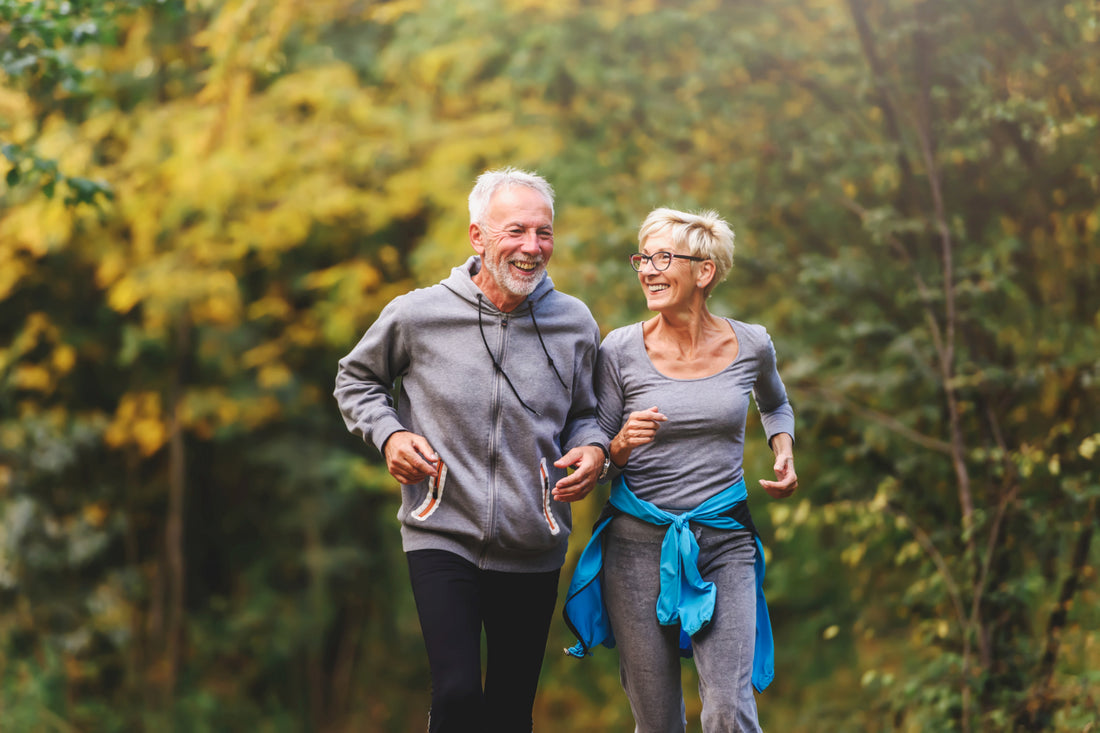As we age, maintaining a healthy lifestyle becomes increasingly important for our overall well-being and quality of life. Healthy lifestyles for healthy older adults encompass a wide range of practices that promote physical, mental, and emotional wellness.
In this blog post, we will explore various aspects of healthy living for seniors, providing practical health tips for the elderly and seniors to help them thrive in their golden years.
Importance of a Balanced Diet
A cornerstone of healthy lifestyles for healthy older adults is proper nutrition. As we age, our nutritional needs change, and it's important to adapt our diets accordingly.
Healthy eating habits can help seniors maintain a healthy weight, reduce the risk of chronic diseases, and boost energy levels.
- Fruits and Vegetables: Packed with essential vitamins, minerals, and fiber.
- Whole Grains: Such as brown rice, quinoa, and whole wheat bread, provide sustained energy.
- Lean Proteins: Including fish, chicken, beans, and nuts, which support muscle health.
- Low-Fat Dairy or Alternatives: For calcium and vitamin D to maintain bone health.

Limit the intake of processed foods, excessive salt, and added sugars, which can contribute to health issues like hypertension and diabetes.
Regular Physical Activity: Nurturing Body and Mind
Staying physically active is essential for maintaining both physical and mental health in older adults. Regular exercise offers multiple benefits, including improved cardiovascular health, maintained muscle strength and bone density, enhanced balance and flexibility, and boosted mood and cognitive function. The Centers for Disease Control and Prevention (CDC) recommends that older adults aim for at least 150 minutes of moderate-intensity or 75 minutes of vigorous-intensity aerobic activity per week and muscle-strengthening activities at least twice a week.
Always consult with a primary care doctor before starting a new exercise regimen to ensure it's safe and appropriate for your health status.
Socialize: Connecting with Friends, Family, & Neighbors
Social connections play a vital role in maintaining healthy lifestyles for older adults. Regular social interactions can help combat feelings of loneliness and social isolation, which are common challenges for many seniors. Engaging with others can boost mood, cognitive function, and overall well-being.
Socializing provides emotional support, gives a sense of belonging, and can even stimulate cognitive function through conversation and shared activities.
Consider joining clubs, attending community events, volunteering, or participating in group activities to stay socially active. Even in times when face-to-face interactions might be limited, technology offers many ways to stay connected with loved ones and make new friends.
Mental Health and Cognitive Wellness
Maintaining good mental health is an essential aspect of a healthy lifestyle. As we age, it's normal to experience some changes in cognitive function, but there are many ways to keep our minds sharp and active.
Cognitive Exercises for Brain Health
Engaging in mentally stimulating activities can help maintain cognitive function and potentially reduce the risk of age-related cognitive decline. Playing games, solving puzzles, and learning new skills are excellent ways to keep your brain active and challenged.
Additionally, participating in games or exercises that involve more than two people fosters a sense of connection and helps prevent older adults from experiencing feelings of isolation.
For seniors dealing with cognitive challenges, engaging in sensory activities for dementia patients can be particularly beneficial. These activities stimulate the senses and can help improve mood, reduce anxiety, and enhance overall quality of life. Examples include aromatherapy, music therapy, and tactile activities like working with textured materials.
Here are a few examples of brain-stimulating activities for dementia patients:
Practice Meditation
When you're feeling relaxed and full of energy, it becomes easier to slow down and pay attention to the little things.
Meditation has been shown to reduce stress, alleviate anxiety, and even help with depression. It can also have a positive effect on your brain by stimulating neural pathways, which can improve your ability to observe, be mentally flexible, and maintain focus and concentration.

Learn New Skills
Engaging in social activities is a great way to keep your mind sharp and active. Research has shown that people who maintain an active social life tend to have better cognitive functions and a reduced risk of dementia.
Activities like playing games, participating in social sports, and interacting with others can help stimulate the brain. For seniors looking to stay socially active, some ideas include joining a walking group at a local park or becoming part of a book club.
Play Different Board Games
Playing board games is a fun way to get your brain working. A study by the National Library of Medicine indicates that playing different board games, video and memory games for adults may help with cognition.
These include:
- Activate cognitive functions
- Enhance your reasoning ability
- Improve working memory, focus, and perception
Also, solving jigsaw puzzles helps maintain your ability to recognize visual and spatial connections among objects (visuospatial cognition). Different board games like jigsaw puzzles, chess, Sudoku, crossword puzzles, and checkers can be the best ways to exercise and challenge your brain.
Read books
Engaging in regular reading is an excellent way to exercise your brain. When you read, your brain processes each word, recalling its meaning instantly. Moreover, reading stimulates your brain to visualize the subject matter, the characters, and imagine how the dialogues in the book sound in different voices.
The benefits of regular reading include:
- Strengthening your brain
- Improving your ability to understand emotions
- Expanding your vocabulary
- Reducing stress
- Guarding against age-related mental decline
- Easing anxiety and depression
- Promoting good sleep
If you already enjoy reading, consider exploring different genres aside from your usual preferences. This can challenge your brain to connect with new plots, historical eras, characters, and other fascinating facts.
On the other hand, if you're not a fan of reading, start with a book that's fewer than 100 pages and within a genre that interests you.
Emotional and Spiritual Well-Being
Nurturing emotional and spiritual well-being is important for overall good health and life satisfaction in the senior years.
One of the best ways to support emotional well-being is through the practice of mindfulness and meditation. These techniques can help reduce stress and anxiety, improve emotional regulation, enhance self-awareness and mental clarity, and even promote better sleep.
Starting a mindfulness practice doesn't have to be complicated. Begin with short, guided meditation sessions and gradually increase the duration as you become more comfortable with the practice.
Many apps and online resources offer guided meditations specifically designed for seniors.
Beyond meditation, exploring your spiritual beliefs, whether through organized religion or personal practices, can provide a sense of purpose and peace.
Engaging in activities that bring you joy and fulfillment, such as creating art, spending time in nature, or helping others, can also contribute significantly to your emotional and spiritual well-being.
Regular Health Checkups and Preventive Care
Regular checkups are essential for detecting and managing health issues early. Schedule routine visits with your healthcare provider to:
- Monitor Chronic Conditions: Keep track of diseases like hypertension, diabetes, or heart disease.
- Update Vaccinations: Ensure you’re up-to-date on vaccines, such as the flu shot and shingles vaccine.
- Screen for Health Issues: Regular screenings for cancers, cholesterol levels, and bone density are important.
These health tips for the elderly and seniors can help them stay healthy and address potential issues before they become serious.
Quality Sleep for Restorative Health
Getting enough quality sleep is essential for overall health and well-being at any age, but it becomes even more crucial as we get older.

As we age, our sleep patterns may change, and understanding the relationship between seniors and sleep is crucial for maintaining optimal health. To improve your sleep quality -
- Try to stick to a consistent sleep schedule
- Going to bed and waking up at the same time each day.
- Create a relaxing bedtime routine that helps you unwind from the day's activities.
- Ensure your bedroom is conducive to good sleep – it should be dark, quiet, and cool.
- Be mindful of your caffeine and alcohol intake, especially in the evening, as these can disrupt sleep patterns.
Adapting Your Home for Safety and Comfort
Creating a safe and comfortable living environment is an important aspect of a healthy lifestyle for older adults. As we age, our homes may need some modifications to accommodate changing physical needs and reduce the risk of falls or accidents.
Consider these home adaptation ideas:
- Installing grab bars in the bathroom
- Improving lighting throughout the house
- Removing tripping hazards like loose rugs or clutter
- Adding a stairlift if navigating stairs becomes difficult
- Using assistive devices in the kitchen for easier meal preparation
These modifications can help seniors maintain independence and feel more secure in their living space.
Conclusion
Embracing a healthy lifestyle as an older adult involves physical, mental, and emotional well-being. Prioritize nutritious eating, regular physical activity, social connections, and preventive healthcare.
It's never too late to start, so begin with small changes, stay consistent, and seek support. With the right mindset, you can cultivate a lifestyle promoting vitality and joy in your senior years.
Incorporate these health tips for the elderly and seniors into your routine and don't hesitate to seek guidance from healthcare professionals, family, and friends. Remember, the goal is to add life to your years.
REFERENCES
- https://alwayshomeconnected.com/blogs/news/best-foods-for-dementia-patients-to-eat
- https://www.ncbi.nlm.nih.gov/pmc/articles/PMC6536904/
- https://alwayshomeconnected.com/blogs/news/social-isolation-in-seniors
- https://www.health.harvard.edu/mind-and-mood/how-memory-and-thinking-ability-change-with-age
- https://alwayshomeconnected.com/blogs/news/sensory-activities-for-dementia-patients
- https://alwayshomeconnected.com/blogs/news/meaningful-activities-for-dementia-patients
- https://health.ucdavis.edu/blog/cultivating-health/10-health-benefits-of-meditation-and-how-to-focus-on-mindfulness-and-compassion/2022/12
- https://www.ncbi.nlm.nih.gov/pmc/articles/PMC10042352/
- https://alwayshomeconnected.com/blogs/news/memory-games-for-adults
- https://alwayshomeconnected.com/blogs/news/dementia-and-sleep

